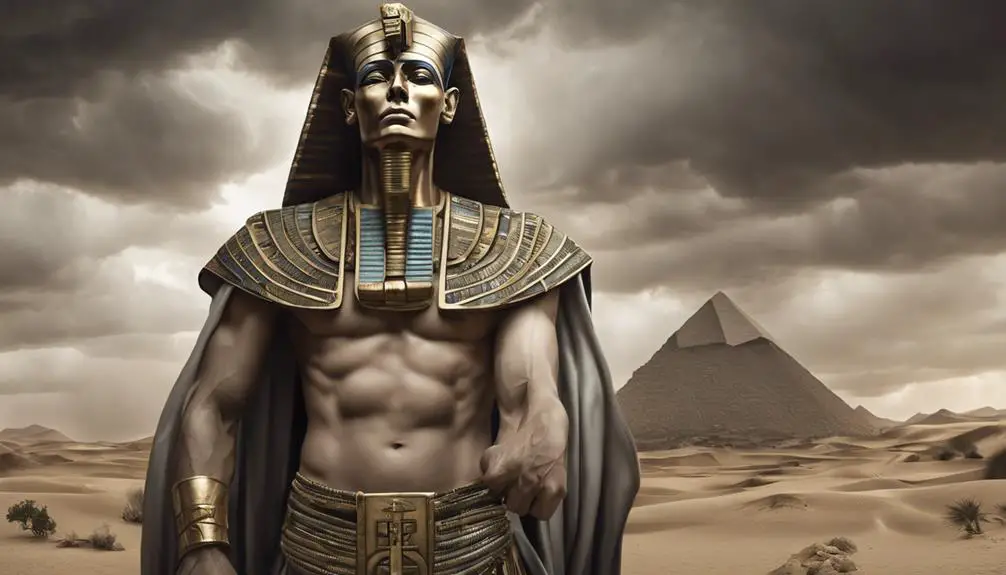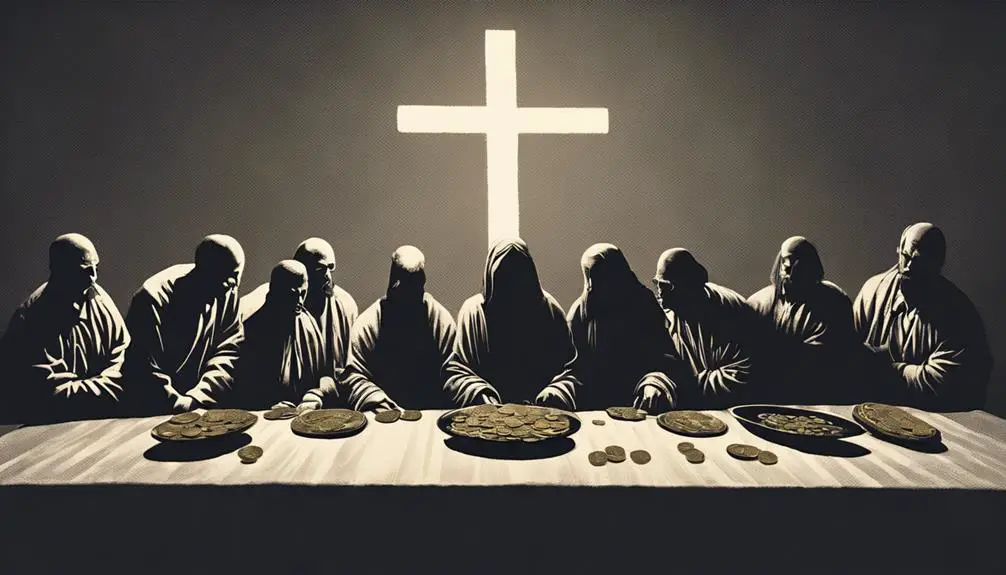Peer into the past as we reveal the notorious troublemakers in the Bible starting with 'P' and their impact on biblical history.

Names of Troublemakers in the Bible
You might not be aware that the Bible is not just a source of divine guidance and moral lessons, but also a chronicle teeming with intriguing and complex characters. Among these are the notorious troublemakers, each bearing a tale that can stir a myriad of conversations.
Would you believe that Cain, the world's first murderer, wasn't the only troublemaker in the Bible? We've got Pharaoh, Jezebel, Judas Iscariot, and even Lucifer himself.
Intrigued? Let's uncover the stories behind these notorious names and how their actions shaped biblical history.
Key Takeaways
- Lucifer, the rebellious angel, and his followers became demons after their expulsion from heaven.
- Judas Iscariot, driven by greed and disillusionment, betrayed Christ, influencing the course of Christian theology.
- Cain, the first murderer in biblical history, was punished by God, symbolizing the consequences of jealousy and murder.
- Notorious figures like Pharaoh and Jezebel show the disastrous effects of hard-hearted rule and manipulative idolatry.
Lucifer: The Fallen Angel

Diving into the complex narrative of Lucifer, you'll encounter a unique character in biblical lore, known as the fallen angel, whose pride and ambition led to an ultimate downfall. Lucifer's rebellion impact is colossal, reshaping the angelic hierarchy and causing ripples throughout creation.
Analyzing the angelic hierarchy, it's pivotal to understand Lucifer's position. As the anointed cherub, he held a ranking of immense prestige, directly serving under God. But this wasn't enough; he desired more, sparking a rebellion that would disrupt the celestial balance.
Lucifer's rebellion impact was cataclysmic, resulting in his expulsion from the heavens. This dramatic event didn't only affect him but also the loyal followers who were cast out and transformed into demons. The aftermath of this rebellion drastically altered the angelic hierarchy, making it a pivotal event in biblical narratives.
Cain: Brother's Murderer

Turning our attention to Cain, the first recorded murderer in biblical history, we find a tale of envy, anger, and fratricide that fundamentally altered the course of humanity. Cain's motivation for this heinous act was driven by jealousy and resentment. His brother, Abel, was favored by God for his offerings, causing Cain's offerings to appear inadequate in comparison. This perceived favoritism ignited a deep-seated envy in Cain, ultimately leading to him murdering his brother.
The consequences of murder were swift and severe for Cain. God, being omniscient, immediately confronted Cain about his brother's whereabouts. Cain's attempt to deflect with the infamous line, 'Am I my brother's keeper?' didn't deter God from delivering justice. He was condemned to a lifetime of wandering, forever marked with a sign, so that potential avengers would know of his crime and spare his life.
Cain's life after the murder was filled with hardship, a stark contrast to his life prior. His actions serve as a potent biblical lesson about the pernicious effects of jealousy and the severe repercussions of murder. His story is a moral compass, guiding us towards understanding the destructive potential of unchecked emotions and the importance of conscience in our actions.
Pharaoh: The Heart-Hardened Ruler

Shifting our focus to the Pharaoh of Egypt, we encounter a ruler whose heart was hardened, leading him to resist Moses' pleas for the liberation of the Israelites. A critical examination of Pharaoh's leadership style reveals a stubborn, unyielding spirit, a trait that significantly affected his decision-making.
Pharaoh's hard-heartedness wasn't merely a personal flaw; it had far-reaching consequences. The impact of his hard-heartedness extended beyond the palace walls, affecting the entire Egyptian society. His inflexible attitude led to a series of devastating plagues that ravaged the land, causing immense suffering to his people.
Pharaoh's leadership style was characterized by dominance, control, and an unwillingness to listen to the voice of reason. His refusal to acknowledge the Israelites' God and disregard for their suffering demonstrated a lack of empathy and understanding. His obstinacy, in the face of clear signs, led to disastrous consequences, reflecting the catastrophic impact of an unyielding leadership style.
Jezebel: The Idolatrous Queen

Drawing a parallel from Pharaoh's obstinacy, we now meet Jezebel, a queen notorious for her idolatrous practices and manipulative tactics. Jezebel's influence on Israel was primarily marked by the promotion of Baal worship, a Canaanite deity, which directly opposed the monotheistic belief of the Israelites. Her role as the queen gave her a unique platform to propagate her beliefs, thus highlighting the role of women in idolatry during her age.
Jezebel wasn't just content with spreading idolatry; she sought to suppress the worship of Yahweh, leading to the persecution of God's prophets. Her determination to eradicate opposition and establish Baal worship demonstrated a ruthless drive that was unmatched, drawing Israel further away from their covenant with God.
Her influence wasn't limited to religious spheres; she manipulated King Ahab, demonstrating her cunning nature. She's infamous for orchestrating Naboth's murder to acquire his vineyard for Ahab, displaying her disregard for Israel's laws and her power over Ahab.
In analyzing Jezebel, you find a woman whose actions were driven by her religious beliefs, but her means of achieving her goals were unscrupulous, making her one of the Bible's most notorious troublemakers.
Judas Iscariot: The Betrayer of Christ

Moving from royal courts to the close circles of Jesus Christ, you encounter Judas Iscariot, a disciple infamous for his act of betrayal. His name is synonymous with traitor, a label he earned by turning against his master, Christ.
To understand Judas Iscariot's actions, it's vital to delve into Judas's motivations. The following points offer insight:
- Greed: Judas was the treasurer among the disciples, often accused of pilfering the funds (John 12:6). His acceptance of thirty pieces of silver to betray Jesus highlighted his avarice.
- Disillusionment: Many scholars suggest that Judas expected a political messiah, who'd overthrow Roman rule. Jesus's spiritual mission may have disappointed him, leading to betrayal.
- Possession: The Bible states that Satan entered Judas (Luke 22:3), influencing his actions.
Next, we look at the Betrayal Impact. Christ's crucifixion, instigated by Judas's betrayal, was a monumental event that changed the course of history. It marked the beginning of Christ's passion and led to his resurrection, central to Christian faith. This act, though treacherous, was a critical part in the fulfillment of biblical prophecy. Thus, Judas's treachery had profound implications, shaping Christian theology and belief.
Frequently Asked Questions
Are There Any Other Notable Troublemakers in the Bible Not Mentioned in This Article?"
Yes, there are other notable troublemakers not mentioned. For example, consider King Ahab's influence; his actions led to significant conflict. Additionally, Judas Iscariot's betrayal is a pivotal event.
However, remember the concept of troublemaker redemption. Even those who cause issues can serve a larger purpose and possibly find redemption, as seen in Paul's transformation from a persecutor of Christians to one of Christianity's most influential figures.
What Are Some Common Characteristics Shared by These Biblical Troublemakers?"
You'll notice that these biblical troublemakers often share traits of deceit, rebellion, and self-centeredness. However, it's key to remember that many also experience redemption and face divine justice.
Their stories aren't just about causing problems; they're also about learning from mistakes and the consequences that follow. Their narratives serve as cautions against these behaviors, but also as reminders of the potential for change and redemption.
How Are These Biblical Troublemakers Portrayed in Other Religious Texts or Traditions?"
You're looking at how these troublemakers are portrayed in other religious texts. In the Quran, their depiction is often similar, reinforcing their disruptive roles.
Yet, some differences appear in a comparative analysis with the Torah. While both texts highlight their mischievous actions, the Torah may offer a more nuanced understanding of their motivations.
It's fascinating to see these variations across religious traditions, shedding new light on these complex figures.
What Impact Did These Troublemakers Have on the Overall Narratives of Their Respective Biblical Books?"
You're examining the impact of certain individuals on their respective biblical narratives. These 'troublemakers' played crucial roles in shaping biblical law and prophecies. Their actions often led to significant changes, serving as catalysts for pivotal events.
Thus, their influence extends beyond their personal stories, deeply affecting the overall narrative. They're not just characters, but drivers of plot and law, and key figures in prophecies. Their contributions are complex and profound.
Are There Any Modern Interpretations or Representations of These Biblical Troublemakers in Popular Culture?"
Yes, you'll find many biblical troublemakers portrayed in modern media. These representations often amplify the troublemakers' influence on modern morality. Film, literature, and even music draw upon their stories, providing fresh interpretations and perspectives.
These modern depictions not only entertain but also subtly critique and question societal norms and values. Thus, their enduring relevance proves the timeless power of these biblical narratives.
Conclusion
In examining Lucifer, Cain, Pharaoh, Jezebel, and Judas Iscariot, you see the biblical representation of disruption and disobedience. These characters' actions challenge divine order, inducing chaos and suffering. Yet, their narratives also serve as cautionary tales, illustrating the dire consequences of straying from righteousness.
You're reminded that faith, obedience, and humility are virtues to strive for, while pride, envy, and betrayal can lead to one's downfall. Thus, these troublemakers offer profound lessons in morality and spiritual conduct.



Sign up